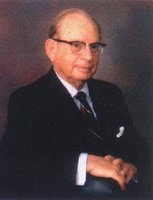Landau, Ralph (About the EoE)

Landau, Ralph
| Topics: |
Ralph Landau (1916–2004) founded one of the world's most successful engineering and design firms, Scientific Design Company, Inc., and its successor corporations, which developed and commercialized nearly a dozen processes for producing petrochemicals.
As a high school student in Philadelphia during the Depression, Landau noticed a newspaper article about the new "glamour field" of chemical engineering and decided that it was the career for him. A scholarship student at the University of Pennsylvania, he majored in chemical engineering and went on to receive his doctorate from the Massachusetts Institute of Technology. As a new Ph.D. he worked for M. W. Kellogg Company, one of the first engineering firms that specialized in design and development for the oil refining and chemical industries. During World War II, Kellogg was asked to build a large-scale facility at Oak Ridge, Tennessee, to separate uranium-235, which was needed for the atomic bomb, from the predominant isotope, uranium-238. Landau was given the responsibility of designing the equipment to produce fluorine, a highly reactive substance needed to make the uranium hexafluoride used in the gaseous diffusion process. He also oversaw the production of the fluorinated compounds used to protect surfaces in contact with the uranium hexafluoride.
After the war he and a construction engineer he had met at Oak Ridge, Harry Rehnberg, started Scientific Design with the objective of improving petrochemical production processes. Much of their business in the early days was abroad, and one of their first successes was an improved method of producing terephthalic acid—the main raw ingredient in polyester fiber—by bromine-assisted oxidation of paraxylene. Worldwide rights for this process were purchased by Standard Oil of Indiana (now Amoco). Another triumph was an improved process for producing propylene oxide, a substance used in polyurethane foams and in rigid polymers; in this case the partner in the new corporation, called Oxirane, was Atlantic Richfield (Arco).
More recently, as a faculty member of the economics department at Stanford University and a fellow at Harvard's Kennedy School of Government, Landau focused on understanding the political and economic environment necessary to encourage technological innovation—the lifeblood of a successful economy.
Further Reading